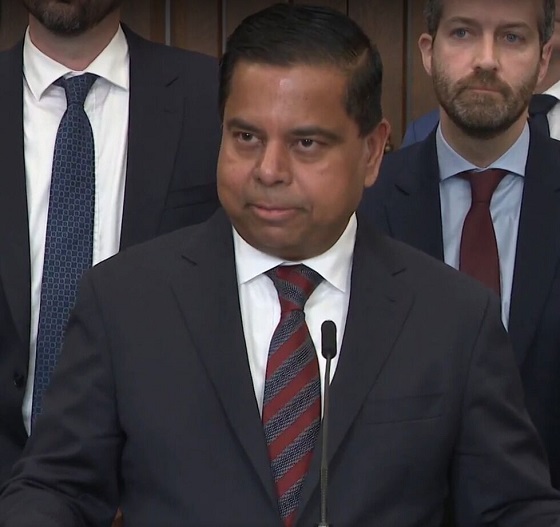Alberta
Albertans don’t have to choose between heating and eating. Here’s how you keep your home warm this winter

Alberta’s Winter Rules for utilities protect vulnerable Albertans by helping keep their lights on and homes warm during the cold winter months.
When temperatures drop, Alberta’s Winter Rules for utilities are designed to keep the power and heat on for Albertans during the cold winter months. Ensuring Albertans have access to reliable and affordable energy is a top priority for Alberta’s government.
From Oct. 15 to April 15, electricity and natural gas services in Alberta cannot be fully disconnected by retailers. This also applies to any time during the year when the forecast for the next 24 hours indicates temperatures below zero degrees.
“During Alberta’s harsh winters, no one should be forced to choose between heating and eating. We’re keeping the lights on for the most vulnerable and taking action to lower power bills for all Albertans. I encourage anyone having difficulties with their utility bill to contact the Utilities Consumer Advocate and learn what options are available.”
Under the Winter Utilities Reconnection program, customers with disconnected utilities are contacted to help get them reconnected before the cold weather hits. This is led by the Utilities Consumer Advocate (UCA), in partnership with the Alberta Utilities Commission (AUC), utility retailers and distributors and other government agencies. Albertans who are having difficulty with paying their utility bills, communicating with their retailer or making manageable payment arrangements should contact the UCA.
“The Winter Utilities Reconnection Program is an important protection for customers struggling with utility bills. UCA Mediation Staff are available to help customers get energy utilities reconnected and stay safe during winter. They can be reached at 310-4822.”
Alberta’s government is working tirelessly to lower utility bills and protect ratepayers, ensuring Albertans keep more of their hard-earned dollars in their bank accounts. With more still to come, Alberta’s government has already taken action by stabilizing local access fees through new legislation, introducing regulations to prevent power price spikes and investing in programs to help municipalities and rural Albertans manage and lower their energy costs. Additionally, the UCA continues to help consumers better understand and navigate the utility market, and their advocacy has led to Albertans saving more than $3.2 billion over the past two decades.
Affordable electricity options are available
Alberta has a unique competitive electricity market, which gives Albertans the power to choose the best energy provider, plan and payment option to fit their needs. Consumers can purchase their power from more than 50 competitive retailers, with the choice of either fixed or variable rate contracts.
Albertans are encouraged to explore their options and find the competitive rate best-suited to their needs. Last year, tens of thousands of households moved off the Rate of Last Resort to competitive contracts for a more affordable option. Albertans who are looking for help with their utility bills or are experiencing a dispute with their provider should contact the Utilities Consumer Advocate at 310-4822, via email, or through their website.
Related information
- Utilities Consumer Advocate
- Financial Assistance Resources (UCA)
- Alberta Utilities Commission
- Farm fuel and rural utility programs
Related news
- Introducing the Rate of Last Resort (Sept. 25, 2024)
- Helping Alberta communities lower energy costs (Sept. 24, 2024)
- Helping Calgarians save millions on their power bills (Sept. 19, 2024)
- Power rates slashed in half by new market rules (Sept. 5, 2024)
- Power watchdog supports Alberta’s electricity market reforms (Aug. 5, 2024)
- Preventing power price spikes (June 26, 2024)
- Making utility bills more affordable (April 22, 2024)
- Making electricity more affordable (April 18, 2024)
Alberta
Alberta announces citizens will have to pay for their COVID shots

From LifeSite News
The government said that it has decided to stop ‘waste’ by not making the shots free starting this fall.
Beginning this fall, COVID shots in the province will have to be pre-ordered at the full price, about $110, to receive them. (This will roll out in four ‘phases’. In the first phases COVID shots will still be free for those with pre-existing medical conditions, people on social programs, and seniors.)
The UCP government in a press release late last week noted due to new “federal COVID-19 vaccine procurement” rules, which place provinces and territories as being responsible for purchasing the jabs for residents, it has decided to stop “waste” by not making the jab free anymore.
“Now that Alberta’s government is responsible for procuring vaccines, it’s important to better determine how many vaccines are needed to support efforts to minimize waste and control costs,” the government stated.
“This new approach will ensure Alberta’s government is able to better determine its overall COVID-19 vaccine needs in the coming years, preventing significant waste.”
The New Democratic Party (NDP) took issue with the move to stop giving out the COVID shots for free, claiming it was “cruel” and would place a “financial burden” on people wanting the shots.
NDP health critic Sarah Hoffman claimed the move by the UCP is health “privatization” and the government should promote the abortion-tainted shots instead.
The UCP said that in 2023-2024, about 54 percent of the COVID shots were wasted, with Health Minister Adriana LaGrange saying, “In previous years, we’ve seen significant vaccine wastage.”
“By shifting to a targeted approach and introducing pre-ordering, we aim to better align supply with demand – ensuring we remain fiscally responsible while continuing to protect those at highest risk,” she said.
The UCP government said that the COVID shots for the fall will be rolled out in four phases, with those deemed “high risk” getting it for free until then. However, residents who want the shots this fall “will be required to pay the full cost of the vaccine, the government says.”
The jabs will only be available through public health clinics, with pharmacies no longer giving them out.
The UCP also noted that is change in policy comes as a result of the Federal Drug Administration in the United States recommending the jabs be stopped for young children and pregnant women.
The opposite happened in Canada, with the nation’s National Advisory Committee on Immunization (NACI) continuing to say that pregnant women should still regularly get COVID shots as part of their regular vaccine schedule.
The change in COVID jab policy is no surprise given Smith’s opposition to mandatory shots.
As reported by LifeSiteNews, early this year, Smith’s UCP government said it would consider halting COVID vaccines for healthy children.
Smith’s reasoning was in response to the Alberta COVID-19 Pandemic Data Review Task Force’s “COVID Pandemic Response” 269-page final report. The report was commissioned by Smith last year, giving the task force a sweeping mandate to investigate her predecessor’s COVID-era mandates and policies.
The task force’s final report recommended halting “the use of COVID-19 vaccines without full disclosure of their potential risks” as well as outright ending their use “for healthy children and teenagers as other jurisdictions have done,” mentioning countries like “Denmark, Sweden, Norway, Finland, and the U.K.”
The mRNA shots have also been linked to a multitude of negative and often severe side effects in children and all have connections to cell lines derived from aborted babies.
Many Canadian doctors who spoke out against COVID mandates and the experimental mRNA injections were censured by their medical boards.
LifeSiteNews has published an extensive amount of research on the dangers of the experimental COVID mRNA jabs that include heart damage and blood clots.
Alberta
Alberta’s grand bargain with Canada includes a new pipeline to Prince Rupert

From Resource Now
Alberta renews call for West Coast oil pipeline amid shifting federal, geopolitical dynamics.
Just six months ago, talk of resurrecting some version of the Northern Gateway pipeline would have been unthinkable. But with the election of Donald Trump in the U.S. and Mark Carney in Canada, it’s now thinkable.
In fact, Alberta Premier Danielle Smith seems to be making Northern Gateway 2.0 a top priority and a condition for Alberta staying within the Canadian confederation and supporting Mark Carney’s vision of making Canada an Energy superpower. Thanks to Donald Trump threatening Canadian sovereignty and its economy, there has been a noticeable zeitgeist shift in Canada. There is growing support for the idea of leveraging Canada’s natural resources and diversifying export markets to make it less vulnerable to an unpredictable southern neighbour.
“I think the world has changed dramatically since Donald Trump got elected in November,” Smith said at a keynote address Wednesday at the Global Energy Show Canada in Calgary. “I think that’s changed the national conversation.” Smith said she has been encouraged by the tack Carney has taken since being elected Prime Minister, and hopes to see real action from Ottawa in the coming months to address what Smith said is serious encumbrances to Alberta’s oil sector, including Bill C-69, an oil and gas emissions cap and a West Coast tanker oil ban. “I’m going to give him some time to work with us and I’m going to be optimistic,” Smith said. Removing the West Coast moratorium on oil tankers would be the first step needed to building a new oil pipeline line from Alberta to Prince Rupert. “We cannot build a pipeline to the west coast if there is a tanker ban,” Smith said. The next step would be getting First Nations on board. “Indigenous peoples have been shut out of the energy economy for generations, and we are now putting them at the heart of it,” Smith said.
Alberta currently produces about 4.3 million barrels of oil per day. Had the Northern Gateway, Keystone XL and Energy East pipelines been built, Alberta could now be producing and exporting an additional 2.5 million barrels of oil per day. The original Northern Gateway Pipeline — killed outright by the Justin Trudeau government — would have terminated in Kitimat. Smith is now talking about a pipeline that would terminate in Prince Rupert. This may obviate some of the concerns that Kitimat posed with oil tankers negotiating Douglas Channel, and their potential impacts on the marine environment.
One of the biggest hurdles to a pipeline to Prince Rupert may be B.C. Premier David Eby. The B.C. NDP government has a history of opposing oil pipelines with tooth and nail. Asked in a fireside chat by Peter Mansbridge how she would get around the B.C. problem, Smith confidently said: “I’ll convince David Eby.”
“I’m sensitive to the issues that were raised before,” she added. One of those concerns was emissions. But the Alberta government and oil industry has struck a grand bargain with Ottawa: pipelines for emissions abatement through carbon capture and storage.
The industry and government propose multi-billion investments in CCUS. The Pathways Alliance project alone represents an investment of $10 to $20 billion. Smith noted that there is no economic value in pumping CO2 underground. It only becomes economically viable if the tradeoff is greater production and export capacity for Alberta oil. “If you couple it with a million-barrel-per-day pipeline, well that allows you $20 billion worth of revenue year after year,” she said. “All of a sudden a $20 billion cost to have to decarbonize, it looks a lot more attractive when you have a new source of revenue.” When asked about the Prince Rupert pipeline proposal, Eby has responded that there is currently no proponent, and that it is therefore a bridge to cross when there is actually a proposal. “I think what I’ve heard Premier Eby say is that there is no project and no proponent,” Smith said. “Well, that’s my job. There will be soon. “We’re working very hard on being able to get industry players to realize this time may be different.” “We’re working on getting a proponent and route.”
At a number of sessions during the conference, Mansbridge has repeatedly asked speakers about the Alberta secession movement, and whether it might scare off investment capital. Alberta has been using the threat of secession as a threat if Ottawa does not address some of the province’s long-standing grievances. Smith said she hopes Carney takes it seriously. “I hope the prime minister doesn’t want to test it,” Smith said during a scrum with reporters. “I take it seriously. I have never seen separatist sentiment be as high as it is now. “I’ve also seen it dissipate when Ottawa addresses the concerns Alberta has.” She added that, if Carney wants a true nation-building project to fast-track, she can’t think of a better one than a new West Coast pipeline. “I can’t imagine that there will be another project on the national list that will generate as much revenue, as much GDP, as many high paying jobs as a bitumen pipeline to the coast.”
-

 Alberta1 day ago
Alberta1 day agoAlberta’s grand bargain with Canada includes a new pipeline to Prince Rupert
-

 Business1 day ago
Business1 day agoCarney’s European pivot could quietly reshape Canada’s sovereignty
-

 Bruce Dowbiggin11 hours ago
Bruce Dowbiggin11 hours agoWOKE NBA Stars Seems Natural For CDN Advertisers. Why Won’t They Bite?
-

 Crime2 days ago
Crime2 days agoManhunt on for suspect in shooting deaths of Minnesota House speaker, husband
-

 Energy11 hours ago
Energy11 hours agoCould the G7 Summit in Alberta be a historic moment for Canadian energy?
-

 Crime11 hours ago
Crime11 hours agoMinnesota shooter arrested after 48-hour manhunt
-

 conflict4 hours ago
conflict4 hours agoIsrael bombs Iranian state TV while live on air
-

 Aristotle Foundation8 hours ago
Aristotle Foundation8 hours agoThe Canadian Medical Association’s inexplicable stance on pediatric gender medicine



